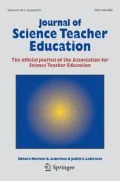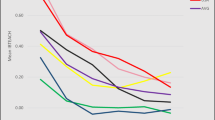Abstract
The current literature relates to how teachers develop knowledge and practice of science inquiry, but little has been reported on how teachers develop interdisciplinary science inquiry (ISI) knowledge and practice. This study examines the effect of university research experiences, ongoing professional development, and in-school support on teachers’ development of ISI pedagogical knowledge and practices. It centers on documenting diverse teachers’ journeys of experiencing ISI as well as developing knowledge of ISI. It was found that there was variation in ISI understanding and practice among the teachers as a result of the combination of teachers’ experiences, beliefs, and participation. Thus, in order to help teachers develop ISI knowledge and pedagogy, barriers to ISI knowledge development and implementation must also be addressed. Professional developers must articulate clear program goals to all stakeholders including an explicit definition of ISI and the ability to recognize ISI attributes during research experiences as well as during classroom implementation. Teachers must also be held accountable for participation and reflection in all aspects of professional development. Program developers must also take into consideration teachers’ needs, attitudes, and beliefs toward their students when expecting changes in teachers’ cognition and behavior to teach inquiry-rich challenging science.
Similar content being viewed by others
References
Coenders, F., Terlouw, C., & Dijkstra, S. (2008). Assessing teachers’ beliefs to facilitate the transition to new chemistry curriculum: What do the teachers want? Journal of Science Teacher Education, 19, 317–335.
Committee on Facilitating Interdisciplinary Research and Committee on Science, Engineering and Public Policy (CFIRCSEP). (2004). Facilitating interdisciplinary research. Washington, DC: National Academies Press.
Cotton, D. R. E. (2006). Implementing curriculum guidance on environmental education: The importance of teachers’ beliefs. Journal of Curriculum Studies, 38, 67–83.
Creswell, J. (2006). Qualitative inquiry and research design: Choosing among five traditions. Thousand Oaks, CA: Sage.
Cronin-Jones, L. L. (1991). Science teacher beliefs and their influence on curriculum implementation: Two cases studies. Journal of Research in Science Teaching, 28, 235–250.
Czerniak, C. M. (2007). Interdisciplinary Science Teaching. In S. K. Abell & N. G. Lederman (Eds.), Handbook of research on science education (pp. 537–559). Mahwah, NJ: Lawrence Erlbaum Associates.
Davison, D. M., Miller, K. W., & Metheny, D. L. (1995). What does integration of science and mathematics really mean? School Science and Mathematics, 95, 226–230.
Ely, M., Anzul, M., Friedman, T., Garner, D., & Steinmetz, A. (2006). Doing qualitative research: Circle within circles. New York, NY: The Falmer Press.
Friedrichsen, P., Driel, J. H. V., & Abell, S. K. (2011). Taking a closer look at science teaching orientations. Science Education, 95, 358–376.
Glesne, C. (2006). Becoming qualitative researchers—An introduction (3rd ed.). Boston, MA: Pearson.
Johnson, C. C. (2006). Effective professional development and change in practice: Barriers science teachers’ encounter and implications for reform. School Science and Mathematics, 106, 150–161.
Mansour, R. (2009). Science teachers’ beliefs and practices: Issues, implications, and research agenda. International Journal of Environmental and Science Education, 4, 25–48.
Miller, P., & Hafner, M. (2008). Moving toward dialogical collaboration: A critical examination of a university–school partnership. Educational Administration Quarterly, 44, 66–110.
Munby, H., Cunningham, M., & Lock, C. (2000). School science culture: A case study of barriers to developing professional knowledge. Science Education, 84, 193–211.
Nargund, V., & Park Rogers, M. A. (2010). Identifying Indian secondary science teachers’ beliefs about science teaching and learning and their alignment with national reform efforts. Paper presented at the annual meeting of National Association for Research in Science Education, Philadelphia, PA.
National Academies (US), Committee on Facilitating Interdisciplinary Research, Committee on Science, Public Policy (US), & Institute of Medicine (US). (2005). The drivers of interdisciplinary inquiry. In National Academy of Engineering (Ed.), Facilitating interdisciplinary research (Chap. 2, pp. 26–40). Washington, DC: National Academy Press. http://www.nap.edu/openbook.php?record_id=11153&page=26.
National Research Council. (1996, 1999, 2000, 2007). National science education standards. Washington, DC: National Academy Press.
National Research Council. (2000). Inquiry and the national science education standards: A guide for teaching and learning. Washington, DC: National Academy Press.
National Research Council. (2011, 2012). A framework for K-12 science education: Practices, crosscutting concepts, and core ideas. Washington, DC: National Academy Press.
National Science Foundation. (2014). Math and science partnership program. Retrieved from http://www.nsf.gov/ehr/MSP/.
NGSS Public Release II. (2013). Retrieved from http://www.nextgenscience.org/next-generation-science-standards.
Richards, J. C. (2008). Interdisciplinary teaching: History, theory, and interpretations. In V. L. Akerson (Ed.), Interdisciplinary language arts and science instruction in elementary classrooms: Applying research to practice (pp. 15–29). Mahwah, NJ: Lawrence Erlbaum Associates.
Seidman, I. (2006). Interviewing as qualitative research: A guide for researchers in education and the social sciences (3rd ed.). New York: Teachers College Press.
Smith, D. C., & Neale, D. C. (1989). The construction of subject matter knowledge in primary science teaching. Teaching and Teacher Education, 5, 1–20.
VanDriel, J. H., Beijaard, D., & Verloop, N. (2001). Professional development and reform in science education: The role of teachers’ practical knowledge. Journal of Research in Science Teaching, 38, 137–158.
Wallace, C. S., & Kang, N. (2004). An Investigation of experienced secondary science teachers’ beliefs about inquiry: An examination of competing belief sets. Journal of Research in Science Teaching, 41, 936–960.
Warren, M. R. (2005). Communities and schools: A new view of education reform. Harvard Educational Review, 75, 133–139.
Windschitl, M. (2004). Folk theories of “inquiry:” How preservice teachers reproduce the discourse and practices of an atheoretical scientific method. Journal of Research in Science Teaching, 41, 481–512.
Yerrick, R., Parke, H., & Nugent, J. (1997). Struggling to promote deeply rooted change: The “filtering effect” of teachers’ beliefs on understanding transformational views of teaching science. Science Education, 81, 137–159.
Yin, R. K. (1994). Case study research: Design and methods (2nd ed.). Newbury Park, CA: Sage.
Author information
Authors and Affiliations
Corresponding author
Appendix: Description of Professional Development Workshops
Appendix: Description of Professional Development Workshops
Workshop title | Professional development workshop agenda and area of focus |
|---|---|
Workshop #1 Understanding ISI | Took an in-depth look at Next Generation of Science Standards (NGSS) and component of the National Common Core Standards (NCCC) and the K-12 framework and how it connects to ISI and Interdisciplinary Science and Engineering Partnership (ISEP) Shared scientists explanations and examples of ISI derived from interviews Teachers given cases to identify dimensions of ISI to make understanding more explicit Teachers given an opportunity to discuss how other disciplines can enhance understanding of discipline content knowledge Explanation of pedagogical content knowledge (PCK) framework and the transforming of summer research experiences into classroom lesson linked to student achievement |
Workshop #2 Professional learning communities and the role of the Research Team in the process of ISEP partnership | Explanation and expectations of partnership and the role of the research team as well as topics of PD sessions for the school year. Specific data collection methods and expectations shared with teachers as well as the role of the research team in data collection and reporting Role of STEM students in teachers support as well as understanding and implementation of ISI Reviewing the ISI framework Videos of science scenarios and identification of ISI. Teachers identified aspects of ISI and created maps of their video observations to be shared with the group Exemplary examples of how teachers have collaborated with partners in the ISEP professional learning communities (PLC) |
Workshop #3 and #4 ISI teaching strategies | Teachers given ISI teaching rubric and explored how to rate it Teachers engaged in a lesson with specific roles to go through an ISI investigation on the topic of cell phones and cancer Evaluated ISI lesson through rubric and discussed establishing a common language Teachers identified lesson to revise using ISI, made specific connections to ISI experiences for their students and shared and received peer feedback Teachers visited the local museum and visited exhibits Defined project-based science and ISI overlaps Discussed instructional strategies supporting PBS such as concept maps, 5E model Reiterated dimensions of ISI to explain framework Teachers discuss how exhibits at the museum could be utilized to design PBS units with ISI features embedded within it connecting it to their summer research experiences Provided examples of PBS units on topics such as the effect of solid waste and its effect on a community and identifying ISI components |
Workshop #5 NGSS and Common Core and ISI teaching strategies continued | Helping teachers understand the impact of teacher knowledge of standards and its impact on curricular decisions Teachers completed survey on their understanding of implementing of NGSS, ISI and NCCC and reviewed Teachers connected their current implementation of NCCC standards to the ISI framework Teachers discuss what their needs are related to implementation such as school requirements, equipment and resources Teachers create a unit/lesson they can utilize in their classrooms integrating current standards as well as ISI framework Teachers engage in peer contributions on how other disciplines can be integrated into their science lessons and groups share their lesson plans with other participants |
Workshop #6 Teacher exemplars of ISI lessons | Teachers were provided Summer Research and Implementation exemplars of colleagues that were engaged in ISI in a quality way. The summaries were prepared by the research team and included a description of the summer research, implementation strategies, role of STEM students as well as parent outreach in some cases. Examples from the first year of ISEP teacher projects were shared. STEM students also shared experiences on how they contributed to teacher understanding of ISI and implementation of ISI |
Workshop #7 Assessing ISI | Teachers engaged in a review of the ISI conceptual framework and participated in an ISI investigation called Maintaining water systems. They developed a scoring rubric for ISI learning and applying the ISI rubric to this particular investigation. Groups shared scoring rubrics to agree and come to consensus on important elements of the ISI Framework. Discussion includes advantages and challenges to assessing ISI |
About this article
Cite this article
Chowdhary, B., Liu, X., Yerrick, R. et al. Examining Science Teachers’ Development of Interdisciplinary Science Inquiry Pedagogical Knowledge and Practices. J Sci Teacher Educ 25, 865–884 (2014). https://doi.org/10.1007/s10972-014-9405-0
Published:
Issue Date:
DOI: https://doi.org/10.1007/s10972-014-9405-0




